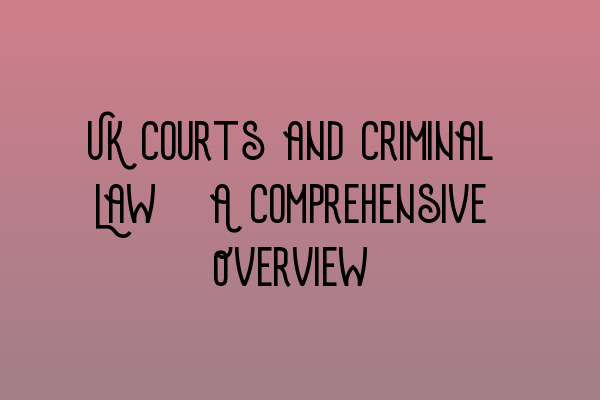UK Courts and Criminal Law: A Comprehensive Overview
Welcome to SQE Criminal Law & Practice Law UK, where we aim to provide you with comprehensive insights into the world of criminal law in the United Kingdom. In this blog post, we will delve into the intricacies of UK courts and criminal law, shedding light on its various aspects. Whether you are a law student, legal professional, or simply an individual looking to expand your knowledge in this field, our aim is to provide you with valuable information that will enhance your understanding of the UK legal system.
The Role of UK Courts in Criminal Law
In the UK, criminal law is administered through a complex network of courts. These courts play a crucial role in upholding justice and ensuring the fair trial of individuals accused of committing crimes. Understanding the hierarchy and jurisdiction of these courts is essential for comprehending the UK criminal justice system.
The UK court system is divided into two main categories: the Magistrates’ Courts and the Crown Courts. Magistrates’ Courts are responsible for handling less serious criminal offenses, such as minor assaults and traffic violations, while the Crown Courts deal with more serious crimes, including murder, serious fraud, and sexual offenses.
Workshops and Seminars on Criminal Practice: Expanding Your Expertise
The Criminal Process in UK Courts
When an individual is accused of committing a crime, they go through a series of legal proceedings within the UK court system. Let’s take a closer look at the various stages of the criminal process:
- Investigation: The police or other law enforcement agencies investigate the alleged crime, gather evidence, and identify the potential suspect(s).
- Arrest: If the police have sufficient evidence to suggest an individual’s involvement in a crime, they can arrest the suspect.
- Charge: Once arrested, the suspect is formally charged with the alleged offense by the Crown Prosecution Service (CPS) or other prosecuting authorities.
- First Court Appearance: The suspect appears before the Magistrates’ Court for the first time, where they have the opportunity to enter a plea.
- Updates in UK Criminal Laws: Staying Informed and Prepared
- Mode of Trial: The Magistrates’ Court decides whether the case should be heard in their court or be transferred to the Crown Court.
- Trial: If the case proceeds to trial, the Crown Court conducts a thorough examination of the evidence presented by the prosecution and the defense.
- Sentencing: If the defendant is found guilty, the court proceeds with the sentencing process, taking into consideration various factors such as the severity of the crime and the defendant’s criminal record.
- Appeal: Both the prosecution and the defense have the right to appeal the court’s decision if they believe there was an error in law or procedure.
Understanding the criminal process is essential for lawyers, as it enables them to guide their clients through each stage of the proceedings effectively.
Legal Protections and Support for Victims
The UK criminal justice system recognizes the importance of ensuring the rights of victims are protected throughout the legal process. Victims of crime are entitled to certain legal protections and support, including:
- Special measures in court to help victims provide their evidence comfortably.
- Access to support services, such as counseling and advocacy.
- Ensuring Rights of Victims in Criminal Procedures: Legal Protections and Support
- Compensation for physical, emotional, and financial harm caused by the crime.
These legal protections and support mechanisms are essential for victims, as they aim to minimize the impact of the crime on their lives and facilitate their recovery.
Staying Informed and Prepared with SQE Criminal Law & Practice Law UK
At SQE Criminal Law & Practice Law UK, we understand the importance of ongoing learning and development in the field of criminal law. Whether you are a legal professional, a law student, or simply someone interested in deepening your understanding of criminal practice, we offer a range of resources to support your professional growth.
Enhancing Your SQE Criminal Law Study Group Experience
Our workshops and seminars provide a platform for legal professionals to expand their expertise, stay updated with the latest developments in criminal law, and enhance their practical skills. We also offer detailed analysis on various aspects of criminal law, such as decoding criminal evidence rules and understanding the implications of recent legal updates.
To stay informed and prepared in the dynamic field of criminal law, it is crucial to engage in continuous professional development. Our resources aim to support your journey towards becoming a knowledgeable and skilled criminal law practitioner.
Conclusion
In conclusion, understanding the workings of UK courts and criminal law is essential for legal professionals and individuals interested in this field. By familiarizing yourself with the UK court system, the criminal process, and the legal protections for victims, you can navigate this complex landscape more effectively.
Make sure to explore our related articles for further insight:
- Workshops and Seminars on Criminal Practice: Expanding Your Expertise
- Updates in UK Criminal Laws: Staying Informed and Prepared
- Enhancing Your SQE Criminal Law Study Group Experience
- Decoding Criminal Evidence Rules: A Detailed Analysis
- Ensuring Rights of Victims in Criminal Procedures: Legal Protections and Support
We hope this comprehensive overview has provided you with valuable insights into UK courts and criminal law. For more information and resources, feel free to explore our website and engage with our workshops and seminars.
Stay informed, stay prepared, and continue your journey towards becoming an expert in criminal law!
